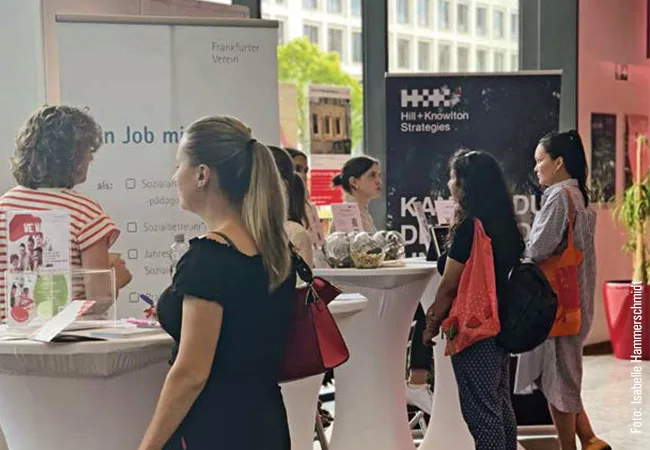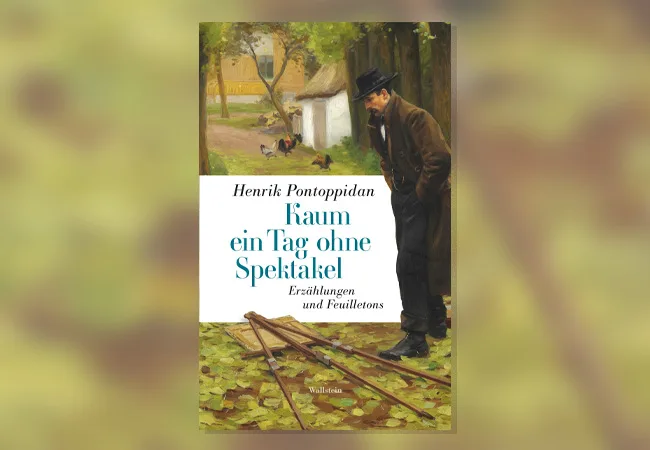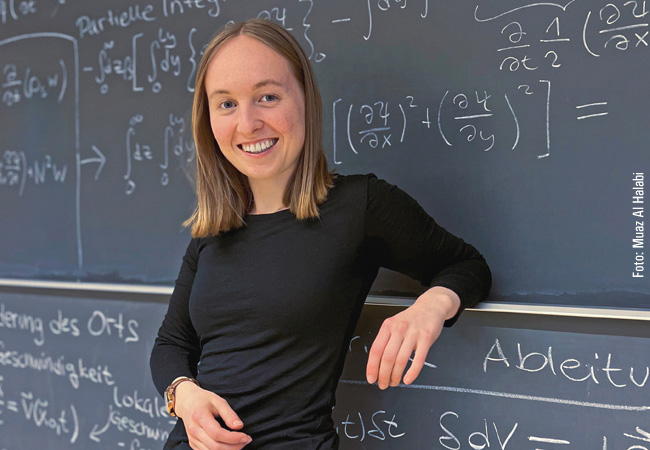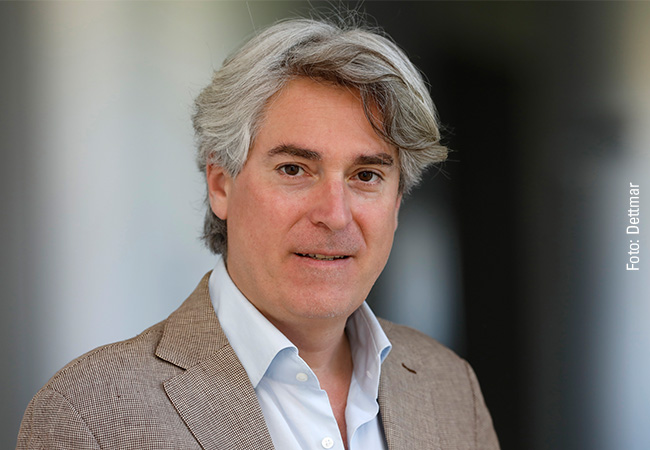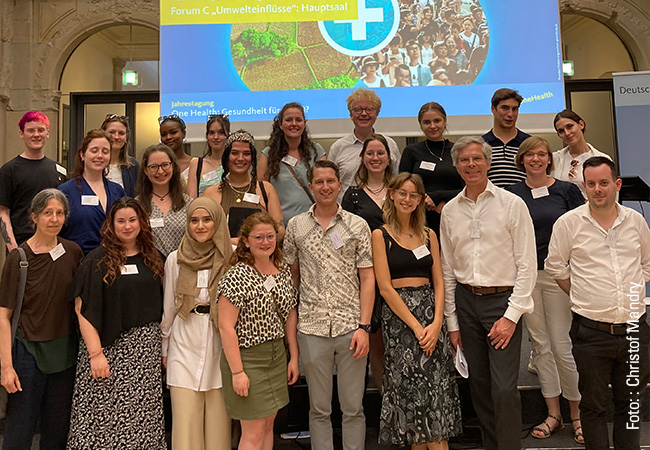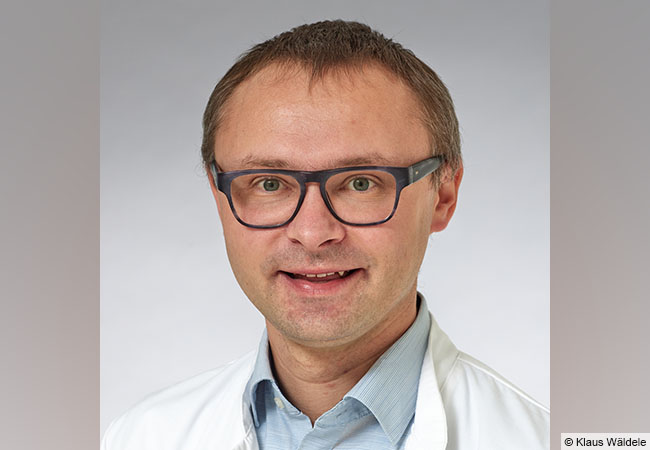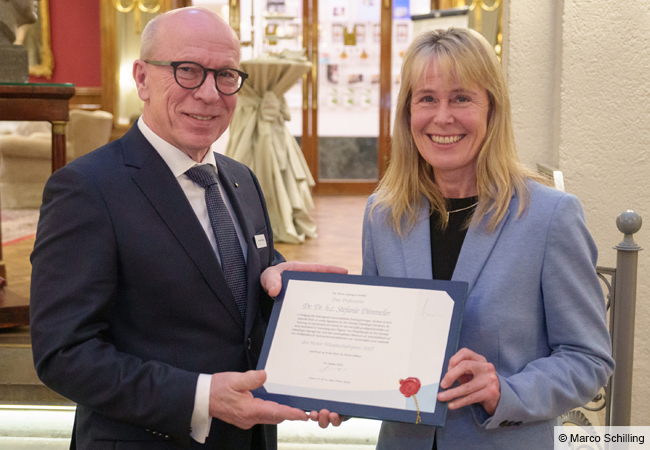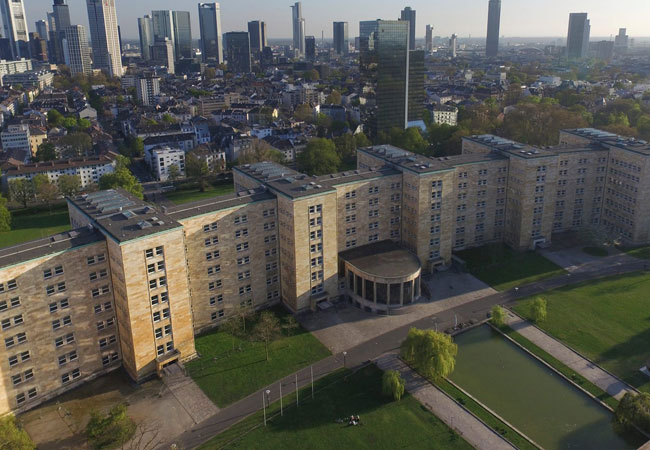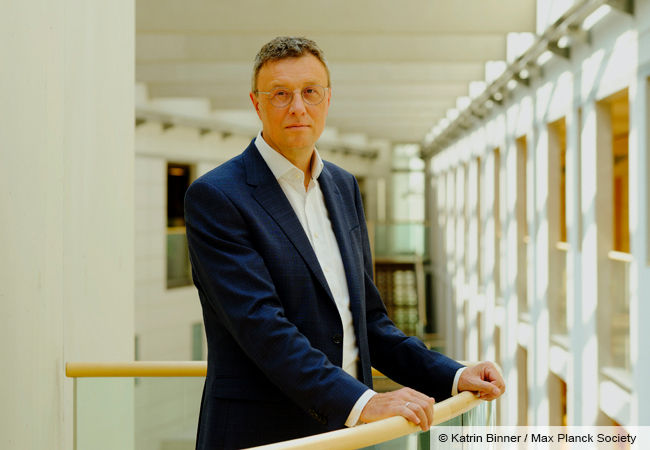This year, Goethe University Frankfurt’s Library for Social Sciences and Psychology [Bibliothek Sozialwissenschaften und Psychologie, BSP] is celebrating its 10-year anniversary on Westend Campus. Although the library is but a decade old, the remains of a fascinating 19th century building continue to have a great impact on what goes on inside.
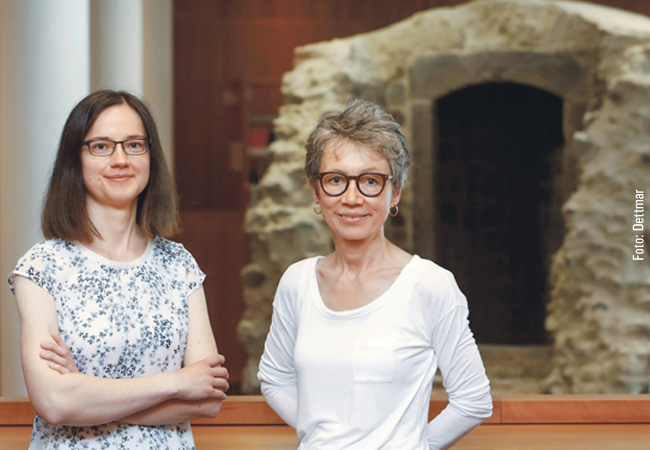
There is probably no other faculty library at Goethe University that has such a profound impact on anyone entering it. Immediately after passing through the entrance doors, visitors’ attention is drawn to an old relic resting on a podium, which was placed under monumental protection in 2009. Many believe that what they are looking at are the remains of a tower. That was also the original assumption when, during Westend Campus’ second construction phase in 2007, the building works revealed some walls inside a mound of earth. The assumption that these were the remnants of another “watchtower” seemed quite plausible – after all, a few such structures exist elsewhere in Frankfurt, including the Eschersheimer Turm. Today, however, the experts have a different theory that – quite literally – points in the opposite direction: Rather than a tower, it is believed that these are the remnants of a shaft that once connected to an ice cellar. In fact, the site now occupied by the PEG building once housed the “Institute for Lunatics and Epileptics”. Its first director was a doctor by the name of Heinrich Hoffmann, best known today for his classic children’s book “Struwwelpeter”.
That is why archaeologist Prof. Hans-Peter Kaehnel likes to talk of “Struwwelpeter’s ice cellar.” The ice was used back then to treat patients, but given that there was not yet any electric refrigeration, it had to be stored in a specially designed system behind several walls.
“Of course you can find many libraries the world over that are housed in historic buildings. But it’s comparatively rare to find a library that houses a historic wall,” says Anette Müller, director of the BSP Library for Social Sciences and Psychology. For her, the monument standing at the library’s center constitutes an added bonus. BSP deputy director Julia Gildenstern adds: “The ice cellar is a highlight of the guided tours offered at the library. Visitors are extremely interested and fascinated by it.”
Given that the library already is home to such an unusual relic, are there any other special features worth mentioning? “Of course,” says Müller. “Located in its own dedicated room, our so-called ‘test collection’ comprises tests for students and researchers from the Faculty of Educational Sciences as well as the Faculty of Psychology and Sports Sciences. The testing procedures exist only as hardcopies and are not publicly accessible – a requirement of the professional associations that naturally do not want just anybody to see the tests and the evaluations. After all, for testing procedures to be valid they cannot be known to the general public. That is why anyone wanting to access the test collection either has to be studying toward or working in a profession in educational science or psychology, and also needs to demonstrate a scientific interest in psychological tests.”
Another special feature, Müller explains, is a workroom for the blind and visually impaired, equipped with the relevant hardware and software. As a rule, this can be accessed without prior reservation. “The ability of offering such a dedicated room constitutes another one of BSP’s advantages.”
10 years and counting
“We have yet to celebrate our 10-year anniversary,” Müller and Gildenstern say with a laugh. The BSP has been located on Westend Campus since the spring of 2013, when the library relocated from Bockenheim, along with Psychology and Educational Sciences – a move that involved merging the libraries of 22 different institutes. A large portion of BSP’s media came from the AfE Tower – infamously known as the “sociologists’ tower” – which was demolished in 2014. “This centralization makes sense: Not only are we able to offer longer opening hours and better services at a single site, it also ultimately saves resources,” explains BSP director Müller.
Pleasant places for learning
The BSP is a very popular place for learning, thanks in part to its central location. It all began with some 470 workspaces in 2013. “Already back then, my predecessor Rolf Voigt noted that there were not enough workspaces, permanent or otherwise,” Müller says. It turns out he was right. “While we cannot change the building’s architecture, in 2019, we did our outmost to reduce old, rarely consulted stocks, allowing us to remove more shelves and create 36 new workspaces as well as six permanent workspaces.” To account for the library’s increased usage, special funding made it possible for it to open on Sundays this year as well, Gildenstern says. “While the number of visitors we receive on Sundays isn’t quite as great as during the week, it definitely pays off. That being said, we will not be opening on Sundays during the semester break, which in turn will allow us to open our doors again seven days a week starting in October.”
It is important to both women that users feel comfortable in the BSP. Having removed the newspaper stands on the ground floor – most publications are now available online – the library now boasts a relaxed sofa area. In addition to being comfortable, this also affords a certain amount of noise control. “The sofas’ high backs create a separate, calm space – a welcome refuge in a large library, where – naturally – people are not going to be quiet all the time. We’re also trying to improve acoustics by using special panels on both ceilings and walls,” Müller explains. The walls of the library that face the busy Hansaallee thoroughfare, with its heavy traffic, feature windows with triple glazing, keeping the outside noise to a barely noticeable minimum.
A living complex
As is the case in other libraries, the BSP is also no stranger to digitalization. That being said, its staff see their library as located somewhere in the middle between the more traditionally book-based subjects found in the BzG Humanities Library, and the natural sciences represented in the BNat library, where printed objects are few and far between. Müller: “Sometimes we can observe this difference within a specific subject, like psychology. While educational psychology more closely resembles the humanities and still boasts a large number of monographs, the neurosciences appear to be more closely linked to the natural sciences, and are more article-based.” Generally speaking, however, there is a clear and discernible trend toward digital literature that is available at any time. Gildenstern, whose duties include handling purchasing suggestions from the social sciences, estimates that 80 percent of requests submitted are for digital media. Müller emphasizes that change is a natural process at any library; one that visitors may not always perceive immediately. And the fundamental structures of course also remain the same. But apart from that, the library is a “living complex.” “If we regard the library as a whole, and not just the books contained in it, or for that matter just its employees, but also the people who come here to work and learn, then what we see is a living organism that is constantly evolving. We try to adjust our services and offers to new needs.” Her colleague Gildenstern adds, “Research on users tells us that the changes in the BSP were well received: More than once we have been called the favorite library on Westend Campus. Of course that makes us very happy.”


